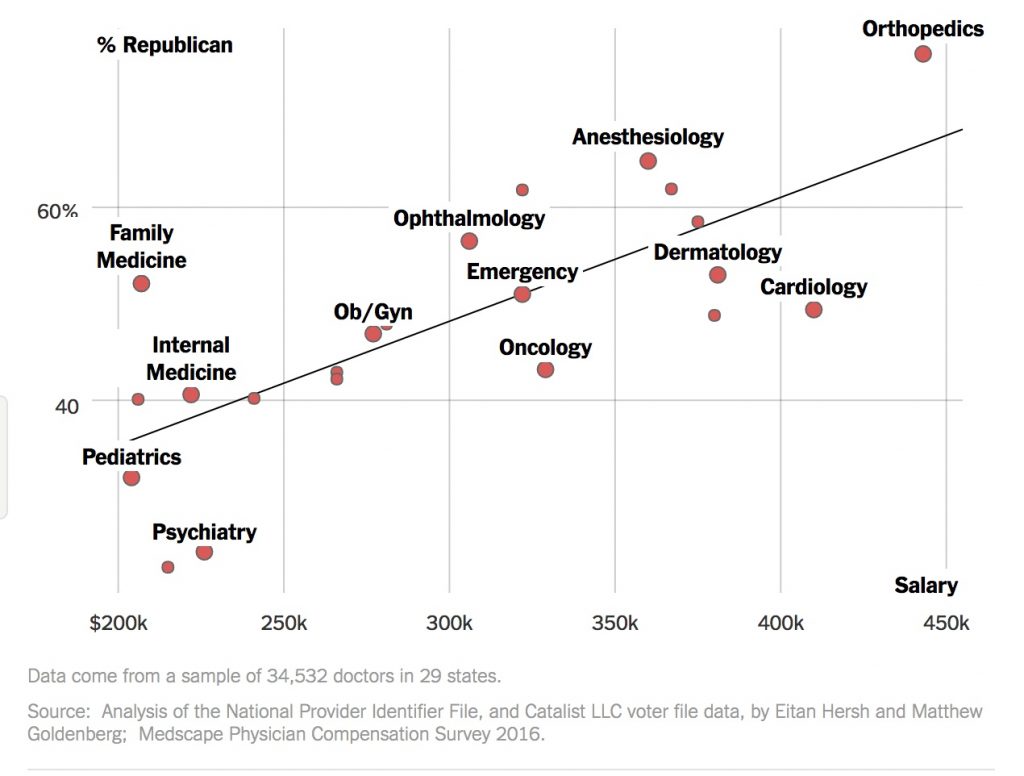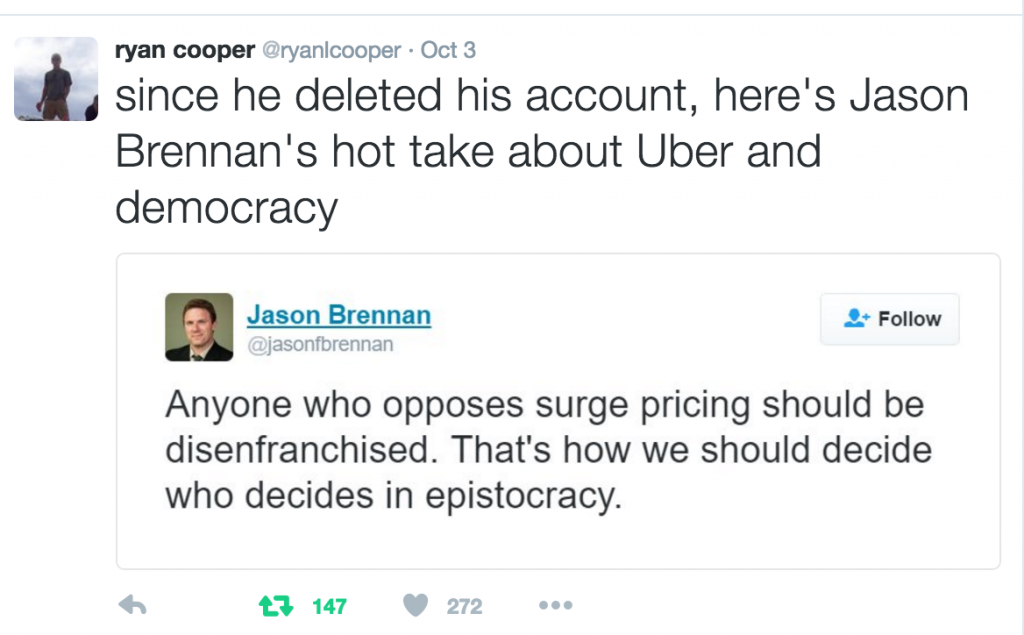by Harry on October 10, 2016
Michael O’Hare has a nice piece about building on campus. The central point is that capital is so cheap, compared with labor, in our business (even at UC Berkeley apparently!) that if better buildings make us more productive the university should invest more in building than they do (at least, if they will invest in the right kinds of buildings):
Consider an improvement of some sort to a classroom with fifty seats, used for 1200 hours a year – new projector, paint the walls, new chairs, whatever. If it could increase learning by the students by 5%, what fraction of the cost of the room would it be worth spending? The answer is 100%: you should be willing to throw the room away and build a whole new one.
A typical senior faculty office is about 10 x 12 feet…. In that office you can get a desk and a chair, bookshelves all over one wall, a couple of file cabinets, and a chair for visitors. If we’re lucky, there’s a tree outside the window, and the élite of profs get a squirrel in the tree. Throw in a printer and a scanner and you need another small table and it starts to get quite tight.
What would increase productivity in my business? I nominate: another real table that seats four, and a couch. Why a couch? For naps; actually everyone would do more, better work with naps, but profs work long hours; the research on this is done and it’s not debatable. The meeting space is because our work requires a lot of small meetings, often unscheduled, with colleagues and with students alone or in small groups.
Three thoughts based on my own experience:
[click to continue…]
by John Q on October 9, 2016
Only a tiny minority of American academics are Republicans, a fact that is a continuing source of angst for much of the political right, as well as quite a few centrists. It’s generally assumed that this fact requires some explanation specific to the way in which universities work. The implicit assumption is that the group of those qualified and willing to take up academic jobs is roughly representative of the US population, and therefore contains roughly equal numbers of Democrats and Republicans. To state that submission is to see immediately what’s wrong with it. As a group, academics are obviously not typical of the US population. They have much more education and significantly higher incomes, though not as high as those of highly educated Americans in general. We know that these two characteristics work in opposite directions politically. Other things equal, more income is positively associated with Republican voting while more education is associated with lower support. So, a proper test of the idea that there is something special about academic voting patterns would begin with a multiple regression incorporating income and education as explanatory variables, then see if a dummy variable for academic employment was (statistically and quantitatively) different from zero.
But this is a blog post, so I’m not going to bother with all that hard work. Rather, I’ll point to this New York times article about the voting patterns of doctors. It includes a bivariate regression of voting patterns on income, with specialisations marked as observations It includes a bivariate regression of voting patterns on income for a sample of 30 000 doctors. This graph shows the resulting regression and plots the mean values for different specializations

[click to continue…]
by Corey Robin on October 9, 2016
Yesterday, the Washington Post revealed that it had obtained a videotape featuring Donald Trump bragging, in the most graphic and ugly terms, about women he’s groped, harassed, demeaned, and more. Within 24 hours, the tape seems to have transformed the political landscape, with legions of Republican leaders now calling on Trump to step down from the ticket.
1.
Across social media, people are wondering why this particular story has proven so explosive for Trump. Given that everyone already knew the vileness of his views on women and the viciousness of his behavior toward them—not to mention Muslims and Mexicans—what’s so different about this story? [click to continue…]
by Chris Bertram on October 8, 2016
by John Holbo on October 8, 2016
So Trump said something truly horrible in 2005. And, it would seem, Hillary’s Wall Street speeches have leaked. Or bits. And internal emails concerning them. (I guess it could turn out that these have been doctored by the Russians, in collaboration with Wikileaks. But it looks like the real deal.) This is going to make that Town Hall debate hot. But, as bombshells go, it’s hard for me to imagine anything less surprising. Everyone already knew – how could it not be? – that Clinton said cosy-cosy stuff to Wall Street folks. And Trump? Is there a single person on the planet surprised that he talks this way? (And surely it isn’t just talk.) Dog bites man. Donald gropes woman. His defenders aren’t even feigning surprise. [click to continue…]
by Corey Robin on October 6, 2016
Harvard in Theory:
“Social and economic inequalities are to be arranged so that they are…to the greatest benefit of the least advantaged….an excessive rate of saving must on balance mitigate the burden of those bearing this hardship.” (Rawls, A Theory of Justice, §46)
Harvard in Practice:
When dining hall workers ask a university with $36 billion in savings to pay them $35,000 a year plus health benefits, they’re forced out on strike.
by Maria on October 5, 2016
… should perhaps listen to Stefan Zweig in 1942:
“The Russians, the Germans, the Spanish, none of them know how much freedom and joy that heartless, voracious ogre the State has sucked from the marrow of their souls. The people of all nations feel only that an alien shadow, broad and heavy, looms over their lives. But we who knew the world of individual liberties in our time can bear witness that a carefree Europe once rejoiced in a kaleidoscopic play of variegated colours. We tremble to see how clouded, darkened, enslaved and imprisoned the world has now become in its suicidal rage.”
It doesn’t have to be this way.
by Henry Farrell on October 5, 2016
This, screencapped by Ryan Cooper right before Jason Brennan suddenly and inexplicably deleted his Twitter account, gives the game away a bit.
 [click to continue…]
[click to continue…]
by Corey Robin on October 5, 2016
In synagogue over the last two days of Rosh Hashanah, I was struck by a passage that I never really noticed in previous years. It’s from Zikhronot, the prayers or verses of remembrance in the Musaf Amidah that we recite on the holiday:
You remember the deeds of the world and You are mindful of Your creatures since the beginning of time.
Before You stands revealed all that is hidden, and every mystery from the moment of creation.
Nothing is forgotten in Your awe-inspiring presence, nothing concealed from Your gaze;
You remember every deed, and nothing in creation can be hidden from You.
Everything is revealed and known to You, Adonai our God; You see to the end of time.
It is You who established a rite of remembrance, to take account of every being, every soul, to recall the multitude of deeds, and call to mind countless creations.
That image a God that remembers every being that has ever lived—and every deed that’s ever been done—since the beginning of time, reminded me of two passages in Hannah Arendt’s Eichmann in Jerusalem, which serve as bookends of the text. [click to continue…]
by Chris Bertram on October 4, 2016
Last Sunday, the 2nd of October, in a vote that defied predictions, Colombians voted in a referendum to reject the peace deal that had been negotiated between their government and the FARC guerillas. Many people were stunned by the outcome. My Facebook feed was full of people typing “WTF?” and similar, utterly uncomprehending that a people could vote for the continuation of this ancient and apparently pointless war. What follows is my own, inexpert take on things, based solely on the fact that I was there for the vote as an international observer and have had an opportunity to talk to some Colombians about what happened (albeit English speaking ones with liberal views). So read what I’ve written with that in mind.
[click to continue…]
by Eric on October 4, 2016
Here they are. I imagine regular readers of this site will spot some familiar names.
by John Holbo on October 1, 2016
UPDATE (March 21, 2021):Â looking for the latest On Beyond Zarathustra stuff? It’s here!
[Long story short. I took, the old stuff down because I’m re-launching it. Doing it right this time!]
by Henry Farrell on September 29, 2016
I’ve an essay on the topic of privatization forthcoming in Nomos. Since the theme may be of interest to CT readers, or at least might get some useful pushback, I’m putting it up beneath the fold. NB that it is quite long – people who want to read it may prefer the PDF.
[click to continue…]
by John Q on September 29, 2016
In my final post on Locke’s theory of appropriation/expropriation, a while back, I mentioned that his latter-day successors, Nozick and Rothbard didn’t offer any improvement. I said at the time I would spell this out a bit more. I’ll start with Rothbard who is more politically relevant, and also, in my opinion, more interesting. As an example, at least during his 1960s flirtation with the radical left, and at the time he developed the theory of ‘homesteading’, he favored reparations for slavery.
The core of Rothbard’s position is that appropriation of property justifies ownership even without the Lockean proviso that ‘enough and as good’ is left over for others. Rothbard doesn’t, as far as I can see, go far beyond presenting this as a self-evident truth, and in any case, I don’t propose to argue about in detail. Rather, I want to look at Rothbard’s choice of the term ‘homesteading’ to describe this process. This choice of term is self-refuting in two ways, one that applies to any historical process of appropriation/expropriation and the other specific to the US.
[click to continue…]
by Corey Robin on September 27, 2016
Two takes on last night’s debate, one from last night, one from this morning.
1.
The single biggest impression I took away from tonight’s debate—beyond the fact that Clinton clearly dominated (with the exception of the opening discussion on jobs and trade)—is how thoroughly conventional a Republican Donald Trump is.
On economics, Trump’s main platform is tax cuts and deregulation. On race and social policy, his main platform is law and order. On foreign policy, his main policy is, well, actually I don’t know. Something about good deals and fee for services.
For all the talk of Trump as somehow a break, both in terms of substance and style, with Republican candidates past, virtually everything he said last night—again, with the exception of his talk on trade and, maybe, NATO—hearkened back to Republican candidates and nominees of the 1970s and 1980s.
With this difference: Trump is a spectacularly ineffective communicator. That Derridean drip of sentences without subjects, references without referents: it’s like a street that goes nowhere. Not even to a dead end.
As for Clinton, [click to continue…]


